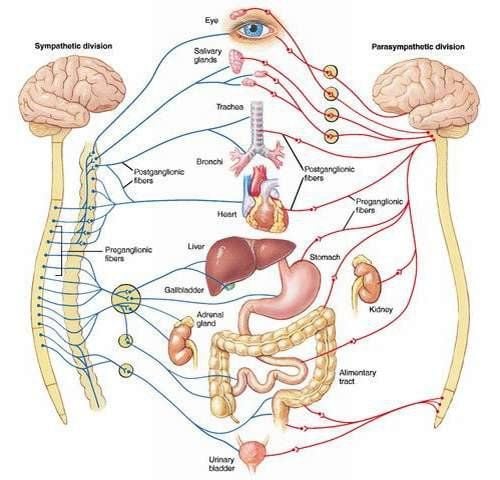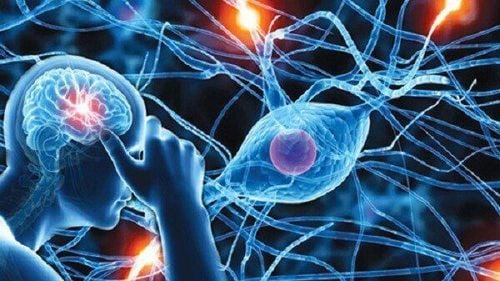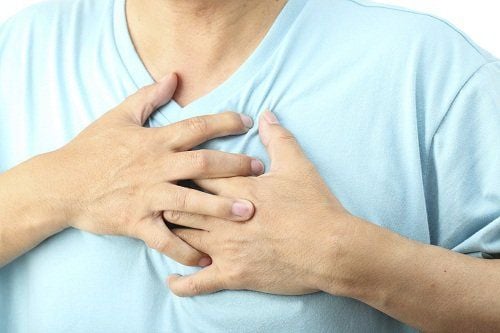This is an automatically translated article.
The article is professionally consulted by Master, Doctor Huynh An Thien - Neurosurgeon - Department of Examination & Internal Medicine - Vinmec Danang International General HospitalAutonomic dysfunction that affects automatic bodily functions including heart rate, blood pressure, perspiration and digestion. Autonomic neuropathy is not a dangerous disease, but it greatly affects the quality of life, causing discomfort and erratic psychological changes.
1. What is autonomic nervous system disorder?
The autonomic nervous system is the organs in the body that are under the control of the automatic nervous system such as the respiratory, digestive, circulatory, and excretory organs. , sweat, ... activities that are not according to the will of humans.
Autonomic nervous system disorders are imbalances of the sympathetic and parasympathetic nervous systems. These two systems are essentially opposites, but sometimes have a narrow synergistic effect. If one of these two systems is disturbed (inhibited, reduced activity) will lead to autonomic nervous system disorder syndrome. It is interesting that the sympathetic and parasympathetic nervous systems are not controlled by the brain, they control the automatic activities of the organs in the body.

2. Is neurovegetative disorder dangerous?
If suffering from this syndrome for a long time, it will seriously affect the patient's psychophysiology. Autonomic nervous system disorders can also lead to changes in organs in the body and cause a number of diseases related to the nervous system, cardiovascular system, digestive system, urinary system, excretory system, and nervous system. respiratory, genitourinary,...Nervous system disorders cause fatigue, sleep disturbances, headaches, chills, neck and shoulder pain, and spine pain. Some patients feel that they cannot continue to live. Slow biological response to light, difficulty driving at night.

Autonomic disorders affecting parts of the body include:
Cardiovascular: palpitations, shortness of breath, fast or slow heart rate, erratic rise and fall in blood pressure, angina pectoris, disability coronary artery disease, difficulty adapting to physical activity, heart rate changes slowly or unchanged in response to physical activity or exercise. With the digestive system: causing digestive disorders due to dysfunctional contractions of the stomach and intestines. Causes a feeling of fullness after eating, loss of appetite, diarrhea, constipation, flatulence, nausea, vomiting, difficulty swallowing and belching. Stimulate defecation during stress. Nervous system: on days of changing weather, there will be vasomotor disorders causing headaches; brain circulation disorder, memory loss, concentration loss, poor sleep, anxiety, sadness without cause. With the urinary system: urinary disorders, causing difficulty urinating, urinary incontinence, urge to urinate under stress and urinary incontinence, which can lead to urinary tract infections. Excretory system: sweating disorder, decreased secretion or excessive secretion, affecting the ability to regulate body temperature, abnormally hot and cold body temperature. With the respiratory system: bronchial smooth muscle spasm causes shortness of breath, which increases with weather changes or stress. Shortness of breath, difficulty breathing, chest tightness, stuffy nose. Musculoskeletal system is affected, joint pain when returning to the sky. And with the genitourinary system, the genitourinary system is affected causing sexual dysfunction, problems achieving or maintaining an erection, premature ejaculation in men, difficulty reaching orgasm. in women with vaginal dryness and menstrual disorders. Autonomic dysfunction is the beginning of many diseases such as: Raynaud's disease, cyanosis of the extremities, red headache, scleroderma, ...

3. Methods of treatment of autonomic nervous disorders
For any disease, in order to be able to treat it, it is necessary to find out the direct cause of the disease and then offer specific treatment methods. The same goes for the treatment of autonomic nervous system disorders, it is necessary to find the cause and destroy it.As we know, the imbalance between the sympathetic and parasympathetic nervous systems is the main cause of the disease, so the thorough treatment is to establish a balance in the nervous system, the balance between the nervous system and the nervous system. sympathetic and parasympathetic. However, at present, there is still no specific method to treat this imbalance. Instead, the treatment of autonomic neuropathy is mainly symptomatic treatment combining medical treatment and surgical treatment.
Can be combined for patients with sedatives, antidepressants, drugs for insomnia, drugs that reduce sweating, adjust bladder spasms to treat urinary disorders. Vitamin B, calcium drugs, combined with Eastern medicine such as acupuncture, hot bath therapy, cold bath, taking anti-depressants, antihypertensive drugs... also work in the combined treatment. a suitable diet such as limiting salty foods, divided into many small meals a day.
Please dial HOTLINE for more information or register for an appointment HERE. Download MyVinmec app to make appointments faster and to manage your bookings easily.














